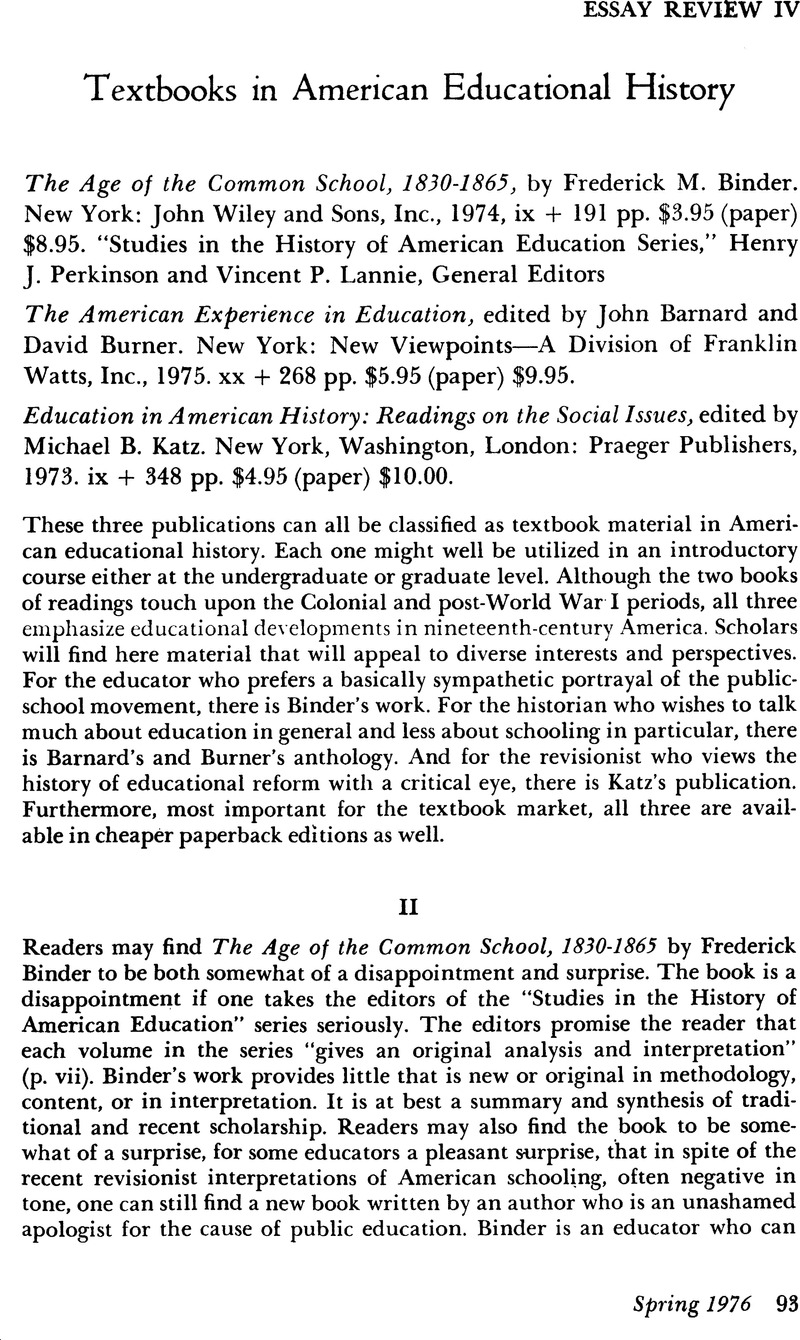No CrossRef data available.
Published online by Cambridge University Press: 24 February 2017

1. McLachlan, James, American Boarding Schools: A Historical Study (New York, 1970), and Katz, Michael B., The Irony of Early School Reform: Educational Innovation in Mid-Nineteenth Century Massachusetts (Cambridge, Mass., 1968).Google Scholar
2. Pessen, Edward, Jacksonian America: Society, Personality and Politics (Homewood, Ill., 1969); Wade, Richard C., The Urban Frontier: The Rise of The Western Cities, 1790–1830 (Cambridge, Mass., 1959); Miller, Douglas T., Jacksonian Aristocracy: Class and Democracy in New York, 1830–1860 (New York, 1967). See also Pessen's, Edward more recent study, Riches, Class and Power before the Civil War (Lexington, Mass., 1973)Google Scholar
3. Reprinted from American Education: The Colonial Experience, 1607–1783 (New York, 1970), pp. 127–37, 192–95.Google Scholar
4. Reprinted from “The Changing Nature of Protestantism in Mid-nineteenth Century America: Henry Ward Beecher's Seven Lectures to Young Men”, Journal of American History 57 (March, 1971): 832–46.Google Scholar
5. Reprinted from People of Plenty (Chicago, 1963), pp. 192–200.Google Scholar
6. Butts, R. Freeman, “Political Education and Political Community”, History of Education Quarterly 14 (Summer, 1974): 169.CrossRefGoogle Scholar
7. Literacy in Colonial New England: An Enquiry into the Social Context of Literacy in the Early Modern West (New York, 1974), pp. 50–51, 57–58.Google Scholar
8. Children and Youth in America: A Documentary History, edited by Bremmer, Robert H. (3 vols.; Cambridge, Mass., 1970–1974).Google Scholar
9. Kett, Joseph F., “Growing up in Rural New England, 1800–1840”, reprinted from Anonymous Americans: Explorations Nineteenth Century Social History, edited by Hareven, Tamara K. (Englewood Cliffs, N.J., 1971), pp. 1–14; Rapson, Richard L., “The American Child as seen by British Travelers, 1845–1935”, reprinted from the American Quarterly 17 (February, 1965): 520–34.Google Scholar
10. Katz, Michael B., “On ‘Crisis in the Classroom’”, reprinted in Education in American History: Readings on the Social Issues, edited by Katz, Michael. (New York, 1973), p. 345.Google Scholar
11. Reprinted from The Educated Woman in America: Selected Writings of Catherine Beecher, Margaret Fuller, and M. Carey Thomas, edited by Cross, Barbara M. (New York, 1965), pp. 1–48; Berkhofer, Robert R., “Model Zions for the American Indian”, reprinted from the American Quarterly 15 (Summer, 1963): 176–90.Google Scholar
12. Reprinted from Beale, Howard K., A History of Freedom of Teaching in American Schools (New York, 1941), pp. 112–15, 116–32, and from Curti, Merle, The Social Ideas of American Educators (New York, 1935), pp. 288–309.Google Scholar
13. Tyack, David, “Bureaucracy and the Common School, The Example of Portland, Oregon, 1851–1913”, reprinted from the American Quarterly 19 (Fall, 1967): 475–98 and Karier, Clarence, “Testing for Order and Control in the Corporate Liberal State”, reprinted from Educational Theory 22 (Spring, 1972): 158–170, 175–76.Google Scholar
14. Reprinted from the American Benedictine Review 16 (1965): 194–209.Google Scholar
15. Reprinted from Dewey's, John Challenge to Education by Handlin, Oscar. (New York, 1959); Karier, , “Testing for Order and Control in the Corporate Liberal State”.Google Scholar
16. “Liberalism and the Quest for Orderly Change”, reprinted from the History of Education Quarterly 12 (Spring, 1972): 57–77.Google Scholar
17. “Modernization in Philadelphia School Reform, 1882–1905”, reprinted from the Pennsylvania Magazine of History and Biographies 94 (July, 1970): 358–83.Google Scholar
18. “Immigrant Social Aspirations and American Education, 1880–1930”, reprinted from the American Quarterly 21 (Fall, 1969): 523–43.Google Scholar
19. Tyack, , “Bureaucracy and the Common School”; Katz, Michael B., “The ‘New Departure’ in Quincy, 1873–81: The Nature of Nineteenth-Century Educational Reform”, reprinted from The New England Quarterly 40 (March, 1967): 3–20; and Hershberg, Theodore, “Free Blacks in Antebellum Philadelphia: A Study of Ex-Slaves, Freeborn, and Socioeconomic Decline”, reprinted from The Journal of Social History 4, No. 4 (1971): 333–56.Google Scholar
20. Tyack, David rejects the motion that urban education is merely the history of “New York or Boston writ large”. See Tyack, , The One Best System: A History of American Urban Education, Harvard Paperback (Cambridge, Mass., 1974), p. 5.Google Scholar
21. “Free Blacks in Antebellum Philadelphia”.Google Scholar